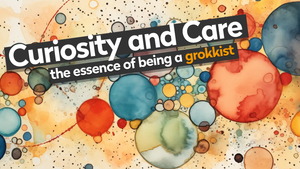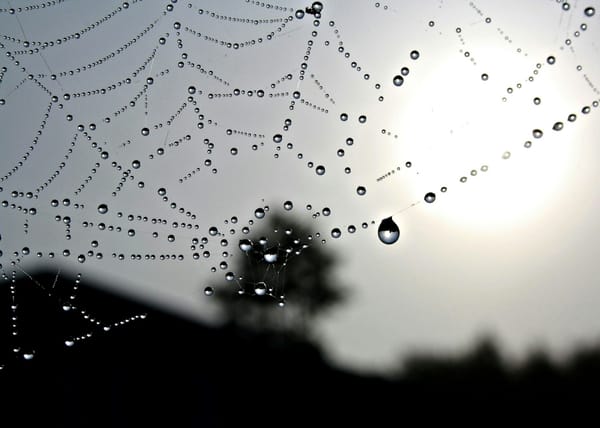The mental health crisis is also a crisis of meaning
In his recent podcast, Nate Hagens discusses how we are living in a mentally and physically sick society. Despite significant technological advancements and material gains, we've seen a corresponding decline in mental health and attention to our inner lives.
Yet, as he writes:
“the Superorganism and the Self coexist in a recursive dance: while the Superorganism influences individual experiences, those experiences collectively influence the Superorganism. The centuries-long prioritization of profit over wellbeing is casting a shadow over the lived experiences of individuals: as material wealth and convenient consumption soar (for many), we are seeing increasingly deteriorating mental health and social fragmentation.”
He continues saying that mental health and resilience are about the most important things that are going to be needed.
Of course, he wasn’t the first person saying this.
Many Indigenous peoples have long stressed the importance of balance and harmony with nature, warning about the repercussions of prioritizing material wealth over spiritual and community well-being.
The Lakota, for instance, caution against excessive focus on material gain. In "Small Is Beautiful," Schumacher criticized economic practices that value growth over human well-being.
Meanwhile, bell hooks discusses how race, capitalism, and media promote a consumption culture that harms emotional and spiritual health, advocating for love, community, and self-awareness as antidotes.
For many people who work in regeneration, mental health has become a key concern.
In fact, for many people who work in regeneration, mental health has become a key concern. Steffi Bednarek who recently published a book on “Climate, Psychology and Change” with contributors such as Thomas Hübel, Bayo Akomolafe and Sally Weintrobe talks about the need for such a change within us.
Philosophical health: the missing piece in mental wellbeing
Mental health is not solely a matter of psychology; it is deeply entwined with philosophy.
While we increasingly recognize how climate change, species extinction, and societal stressors affect psychological and physical health, we often overlook the philosophical dimension. How we understand our purpose, values, and place within the world—our philosophical health—profoundly influences our well-being.
The line between philosophy and psychology is far from distinct. Cognitive behavioral therapy, for instance, draws heavily on practical philosophy, blending its principles with psychological practice.
While psychological health focuses on emotional regulation and cognitive processes, philosophical health delves deeper into aligning our beliefs, values, and actions with the realities we inhabit.
Similarly, physical health, though centered on the body, is often rooted in philosophical principles, such as honoring the interconnectedness of ecosystems.
Fragmenting health into psychological, philosophical, and physical categories may help us analyze specific issues, but it obscures the inherent interconnectedness of these domains, making it difficult to deal with the complexities of the Anthropocene. As the World Health Organization's One Health approach demonstrates, our well-being—personal, societal, and planetary—is deeply relational.
Our well-being—personal, societal, and planetary—is deeply relational.
And yet, One Health is made out of relationships between the parts and one of such parts is our philosophical health.
While acknowledging that compartmentalizing health can be limiting, it also enriches our understanding. The goal isn't to overcome analysis but to remember to relate before, during, and after analysis.
Having said all that, I want to repeat: mental health is not just psychological, it’s also philosophical.
One way philosophical health makes itself known is through self-help, which is often dismissed as not being “real psychology” and not taken very serious by academics and intellectuals. But self-help has deep roots in philosophy. While modern self-help often lacks relational values and care for the whole, practical philosophy, as Jules Evans notes, is
“self-help of the very best kind, that doesn’t focus narrowly on the individual, but instead broadens our minds and connects us to society, science, culture and the cosmos.” Or as Cicero would say, it teaches us to “be doctors to ourselves”.
Philosophical health is something we can actively cultivate, no matter our genetic, biological, or social-ecological circumstances. While we are shaped by these factors, we also have the capacity to engage with and refine the philosophies that guide us.
The human mind is not only able to emotional self-regulate (the ability to purposefully influence one's emotional state) and to consciously control one's attention. The human mind is also capable to of an inner self-regulation concerning what we believe.
Our philosophy is the part that the self can actively steward and nurture, despite turmoil. It's the aspect of our being that can remain healthy even if eventually, the whole world goes apocalyptic on us. As Thomas Mezinger points out
“Our solution must be something deeper. And if it is not accepted by the majority, as the catastrophe continues to unfold, this solution must at least still work on the level of an individual’s life, making life worth living for each person in a dangerous world and a time of failure. Ultimately, it is also about our mental health.”
The mental health Mezinger refers to is, at its core, a form of philosophical health.
Although the term ‘philosophical health’ is relatively new, its roots stretch back to thinkers like Socrates, Epicurus, the Stoics, Nietzsche, Bergson, and Wittgenstein. These traditions highlight the importance of living a life aligned with wisdom and values. Modern works, such as Luis de Miranda’s anthology on philosophical health, continue this lineage, framing it as a vital element of resilience and flourishing.
What is ekophilosophical health and why does it matter?

I interpret ekophilosophical health as the alignment of our ontology (how we understand being), epistemology (how we know), and ethics (how we act) with the reality of our ecos—the physical, social, and ecological environments we inhabit.
We become ekophilosophically healthy when our actions align with our beliefs and our beliefs align with our ecos - our physical home (which includes our body, our community as well as the more-than-human world that we are part of). I think it’s important to add the prefix of eko to acknowledge and keep the awareness of the physical, material reality of our aliveness.
This alignment grounds our sense of self and purpose, reminding us that our beliefs must connect to the material and relational realities of life.
To achieve this, we have to know what our beliefs are and we have to know our ecos.
Philosophical health can therefore be achieved through the practice of philosophy which starts by knowing oneself deeply - as a relational self that is always already entangled and embedded with its environment. Because it’s for knowing ourselves that we can enact self-determination and mental autonomy. The second part of practicing philosophy is therefore to practice living according to those beliefs, values and principles.
Note that I don't claim this inner, philosophical reality is the ultimate reality. Our inner reality is real, as are material and social realities (the ecos). This is not about reducing everything to a philosophical premise but rather including philosophical questions as generative of a good life.
To create regenerative systems, we need ekophilosophical health, and regenerative systems ensure ekophilosophical health. As clinical psychologist Dr. Sanah Ahsan writes in the Guardian:
“The most effective therapy would be transforming the oppressive aspects of society causing our pain.
I want to make clear again that getting to know ourselves - famous through the inscription on the ancient Greek temple of Apollo at Delphi, "Know thyself" (γνῶθι σεαυτόν) - doesn’t mean to merely get to know ourselves as bounded individuals, because that’s truly not who we are, instead, we are entangled, relational, ecological beings that are co-constituted with our environment. Knowing that and knowing our ecos well is part of knowing ourselves.
A key to addressing the mental health crisis lies in recognizing that we are not just psychologically unwell—we are philosophically unwell. We are facing a philosophical health crisis.
Our inability to align our values with our actions stems from outdated systems and beliefs that no longer serve us. To heal, we must cultivate philosophical health by aligning our actions with our beliefs, enabling us to live in harmony with ourselves, others, and the world.
Old belief systems crumble, yet our structures reflect those beliefs and values and resist change.
Rigid frameworks. Like diamonds; unyielding.
Old belief systems crumble, yet our structures reflect those beliefs and values and resist change.
Rigid frameworks. Like diamonds; unyielding.
Not only are many of our philosophies that we hold “sick”, because they are a poor representation of reality of our physical realities, our ecosystems. But also are we philosophically sick, because our values cannot be shown in our actions. We are unable to live according to our values, based on the systems that we have created that make it almost impossible to do so.
While the boundaries between psychological, philosophical, physiological, and planetary health continue to blur, regenerative health calls for a holistic approach rooted in how we think and what we believe. The way forward is to actively practice living our philosophies—not just by reflecting on them, but by embodying them in our daily actions.
This means transforming ourselves while also reshaping the systems we are part of, recognizing that changing those systems begins with rethinking the philosophies that guide them.
Jessica explores the art of practical philosophy, helping others develop their own philosophy to navigate the challenges of the Anthropocene. Her work is a blend of interdisciplinary insights—from ecology and sustainability to spirituality and psychology—crafted into wisdom you can apply to daily life.
For more thought-provoking reflections on living a good life in a complex, changing world, visit Rewilding Philosophy to discover how to live in right relation, embrace paradoxes, and thrive in the gooey soup of meaning-making.











Member discussion